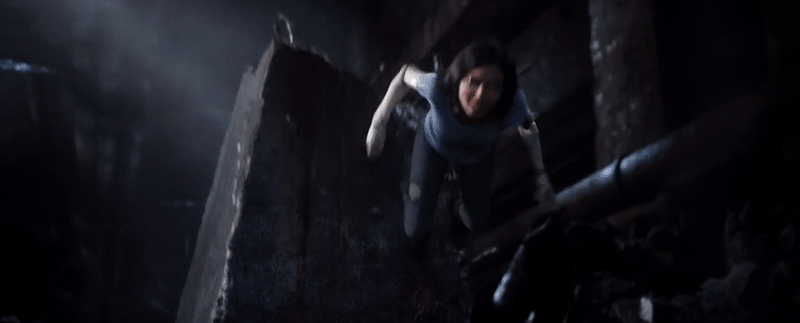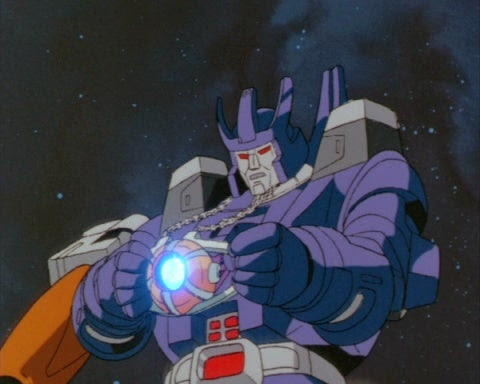

Alita: Battle Angel tells the story of a 26th century cyborg who becomes a bounty hunter in a post-apocalyptic cyberpunk dystopia. After Ido discovers a cyborg's dismembered body in a junkyard, he replaces the missing limbs, revives her and because she has no memory of her former life, names her Alita, after his deceased daughter. Because of her amnesia, everything is new to Alita including: oranges; chocolate; the dangers of city traffic; and dudes.
When she meets local street kid Hugo, she falls for him instantly. The new friends bond quickly over the popular sport motorball (this movie's version of podracing) , which Hugo teaches her, and when he reveals that his dream is to earn enough money to buy his way into Zalem, the "sky city", home to the upper-class, floating above their heads. Alita also unwittingly reveals that she's proficient in panzer kunst, an ancient martial art and is, in fact, an advanced weapon that was built over 300 years ago. These discoveries are made accidentally when Alita learns that Ido earns his living as a bounty hunter and instinctively joins the fight when he's ambushed by a trio of killer cyborgs. She subsequently registers as a bounty hunter as well. Engaging in combat serves to awaken memories of past missions on Mars in Alita.
Following the destruction of her new body during a fight with feared cyborg Grewishka, Ido houses Alita in an advanced battle body which she'd previously retrieved from a crashed spaceship. She proceeds to train as a professional motorball player in the hopes of making enough earnings to finance passage to Tephares with Hugo. However, soon after Hugo admits to dismembering cyborgs so that he can sell their parts, he's mortally wounded by Zapan, one of Alita's bounty hunter rivals, and saved only by attaching his head to a cybernetic body. Shortly afterwards, Hugo is killed during an ill-advised attempt to climb to Tephares using one of the giant cables linking it to Iron city below. The movie ends with Alita winning the professional motorball championship.
That was the long version. The short version is: Alita: Battle Angel is basically a high-tech version of Pinocchio. During the movie, Alita comes of age, maturing from an emotional newborn discovering the world for the first time to a tween becoming aware of boys to a teen rebelling against her parent. When she inevitably falls in love, the feeling is so intense that she literally offers her heart (physically removing it from her chest cavity) to the apple of her eye, Hugo.
While Alita's romance aspect is undoubtedly the reason for the film's release date finally settling on Valentine's Day after several shuffles, this love story steps pretty far over the creep line. Honestly, the passion never quite comes across as mutual. While Alita is lovestruck from the start, Hugo seems to be a nice guy whose friendliness is misinterpreted. Even before Alita takes her heart out of her chest (which is more insane than sweet), she stalks Hugo; he wakes up one morning to find her perched in his window, where she spent the previous night watching him sleep. And after having previously expressed her doubts about Hugo's ability see past their differences (with him being human and all), Alita fails to defend him when he's fatally stabbed by Zapan (after having specifically asked for her protection). Alita's solution is to behead him and to subsequently have Dr. Ido connect him to a completely artificial body -- from the neck down. This outcome conveniently removes most of the "couples'" differences. While it seems like a happy ending from Alita's perspective, Hugo wastes little time heading out of town -- without Alita -- at the first opportunity.
That was the long version. The short version is: Alita: Battle Angel is basically a high-tech version of Pinocchio. During the movie, Alita comes of age, maturing from an emotional newborn discovering the world for the first time to a tween becoming aware of boys to a teen rebelling against her parent. When she inevitably falls in love, the feeling is so intense that she literally offers her heart (physically removing it from her chest cavity) to the apple of her eye, Hugo.
While Alita's romance aspect is undoubtedly the reason for the film's release date finally settling on Valentine's Day after several shuffles, this love story steps pretty far over the creep line. Honestly, the passion never quite comes across as mutual. While Alita is lovestruck from the start, Hugo seems to be a nice guy whose friendliness is misinterpreted. Even before Alita takes her heart out of her chest (which is more insane than sweet), she stalks Hugo; he wakes up one morning to find her perched in his window, where she spent the previous night watching him sleep. And after having previously expressed her doubts about Hugo's ability see past their differences (with him being human and all), Alita fails to defend him when he's fatally stabbed by Zapan (after having specifically asked for her protection). Alita's solution is to behead him and to subsequently have Dr. Ido connect him to a completely artificial body -- from the neck down. This outcome conveniently removes most of the "couples'" differences. While it seems like a happy ending from Alita's perspective, Hugo wastes little time heading out of town -- without Alita -- at the first opportunity.
I strongly dislike watching movies in 3D. But having seen this one in IMAX 3D, I can tell you that it absolutely, spectacularly delivers in that format -- visually. But Alita: Battle Angel's problems both are and are not skin deep.
Like 2017's Ghost in the Shell, Alita: Battle Angel, set to debut February 14, is a live-action adaptation of a 1990s manga (graphic novels created in Japan). What Alita also seems to share with Ghost in the Shell's big-budget incarnation is the fact that white actors have been cast to portray characters who are Asian in the source material. Shell's two central characters, Major and Kuze (both Japanese), are portrayed by white actors, Scarlett Johansson and Michael Pitt, respectively and Alita similarly features white performers.
Cybermedic expert Daisuke Ido, Alita's benefactor and father figure, is portrayed by German-Austrian actor Christoph Waltz. The originally Asian-American scientist has even had his name anglicized to Dyson Ido. You'd think that at least this aspect of the story wouldn't be subjected to white-filtering.
The actress cast as the title character, Cuban-American Rosa Salazar, is also of Peruvian descent. More troubling, according to reports, no Asian actresses were ever on the shortlist for the lead. The movie also features white performers Jennifer Connelly, Jackie Earle Haley, Casper Van Dien and Edward Norton. Asian performers Leonard Wu and Lana Condor will appear in minor roles.
Worse, all of the Black male characters are criminals, bullies and/or cowards who wind up dead by the time the credits roll.
Alita: Battle Angel's screenplay was co-written by James Cameron (who produced the movie as well), who also wrote, directed and produced the white-savior sci-fi epic Avatar. Cameron actually began work on the two films at the same time. Alita actually serves as a sort of James Cameron greatest hits collection, including many of his filmmaking hallmarks. The movie features: lethal cyborgs (The Terminator); motion-capture performances (Avatar); and even an extended underwater sequence (The Abyss). There's even a scene in which a young woman looks down at the man she loves as he drifts down into oblivion (Titanic). Director Robert Rodriguez defends the casting choices by citing the fact that Battle Angel is set in a future North America.
Alita: Battle Angel and Ghost in the Shell aren't even among the first movie adaptations to face accusations of white-washing Asian characters. In recent times, 2015's Aloha, 2016's Doctor Strange and the recently cancelled Netflix series Iron Fist have all been embroiled in white-washing controversies.

No comments:
Post a Comment